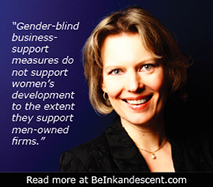
By Beverly Schwartz
Author Rippling: How Social Entrepreneurs Spread Innovation Throughout the World
What impressed me when I read “Wild Company,” by Mel and Patricia Ziegler, was that their story of innovation, risk taking, determination, persistence, and bold action is certainly fascinating, especially in view of their wild success.
That story aligns with the stuff of entrepreneurial endeavors. Have a dream, take a courageous leap, encounter trials and tribulations, learn lessons, hopefully succeed and grow.
But how does entrepreneurship work when success and growth isn’t measured in monetary terms—but in lives saved and the extent to which centuries of social inequities are exposed and restructured?
That is the world that a particular type of entrepreneur—social entrepreneurs—inhabit. Their world shares some of the same challenges, problems and pains of the Ziegler’s world, but it sometimes doesn’t tally well on a spreadsheet of accounts.
She was living in the patriarchal society of Nepal that “acknowledged” women—so long as they were married. So when her husband, a doctor, died in the Gulf War, her new reality was what almost all married women fear—becoming a widow.
Even though Thapa came from an upper-class family, and was herself an educated and accomplished woman who ran a primary school in Kathmandu, she went from high status to almost no status, as dictated by traditional Nepalese cultural norms.

The Woman Who Doesn’t Exist
Thapa was far more fortunate than most. Her family was more modern, her parents and siblings supportive. But her in-laws, the Nepalese laws, and the society she lived in were anything but supportive.
Most women in Nepal have no choice but to assume the role decided for them by hundreds of years of culture and religion. Their superstitious belief is that if a husband dies before his wife, his wife must have bewitched him—and therefore deserves to die herself. Life without her husband is not supposed to be worth living.
Mostly imposed by religious leaders and practiced throughout the ages, widows are not allowed to wear red (or anything colorful), bangles, nose-rings, or other jewelry (they should not look or feel attractive). They are no longer allowed to eat meat (meat is equated with increasing sexuality), and are not allowed to live with or even near their parents (unless they were thrown out of their in-laws’ home). In fact, widows are required to move in with their husband’s family because all joint property previously acquired with their husband now belongs to the husband’s family.
In many families, especially lower-class ones, the brother-in-law has the right to exert economic, social, and even sexual rights over the widow.
The good news is that changing someone else’s life can change your own.
That happened to Thapa the day that a Jesuit priest at her children’s boarding school asked if she would visit another newly widowed woman—one who was suffering badly with her in-laws. So 45 days after she herself was widowed, Thapa went to visit the mother-in-law of another widow whom she did not know.
“When I heard Laxmi’s story, it was terrible, because she was very young and had a young child,” the priest said. “The first time we spoke she did not tell me anything. She just cried and ran. But the next meeting she told me something that always struck me. Her brother-in-law would beat up her 2-year-old son if she didn’t agree to share her bed with him. He left her with no choice. I was so surprised to hear these things, and I had never imagined that this could be happening to a woman here in Kathmandu. I couldn’t stop thinking about her story. I spoke to my other friends and my family and asked how can we could help her.”
Thapa managed to get permission from Laxmi’s mother-in-law to let Laxmi go to school during the day, she paid for Laxmi to go to tailoring school, and then bought her a sewing machine when she graduated.
As soon as Laxmi started to earn money and bring it home, her status within her in-laws’ family changed. She got more respect and now her mother-in-law was the one who protected Laxmi’s son while Laxmi went to work. Thapa got such joy from watching Laxmi flourish that it made her feel fulfilled like never before.
From then on, Thapa knew what she wanted and needed to do. She determined to reverse the age-old taboos and practices and give widows back their human rights.

Sharing Sorrows
Over the next year, widows started to gather at Thapa’s school on Sundays to share their sorrowful stories and get moral support from each other. Through word of mouth, the gatherings became so large that Thapa had to rent a small space close by so widows could have a place to meet during the week. The meetings eventually became every day. She called the space “Bedana bisune thalo,” the Nepalese word for “a platform for sharing.” Thapa and the widows added their own twist to it and called it “a platform for sharing sorrows.”
A year later, Thapa started to volunteer with an organization that helped Nepalese women develop sustainable local enterprises to help them earn enough money to make themselves self-reliant—thereby elevating their status and alleviating many of the restrictions a patriarchal society places on them. During that time, she learned how to institute programs, how to solicit grants and donations and increase funding, what all the structures of government were—and started to apply what she was learning.
At that time, Thapa was only offering a platform to convene widows; she wasn’t actually offering any programs. After two years, she developed her mission and focus. She learned how to write a five-year plan, more sophisticated ways to run an NGO, how to raise women’s voices, how to organize groups. She sold her school, so she could devote full attention to making her new organization, Women for Human Rights (WHR), what it is today.
Are You Seeing Red Yet?
In 1999, with help from many NGO groups around Nepal, WHR organized the first-ever widow’s gathering in Kathmandu. It was the talk of the media as well as Nepal. Never had such gathering of women come from all over the country as a group. And the learnings were immense.
Nepal is divided into 75 districts and 3,915 villages. Most are located in mountainous terrain, and if anyone has ever hiked the Himalayas, you have seen the precarious places where many of the villages are located. From its initial village-to-village campaign all over the mountains to the present, WHR has organized groups in 425 villages located in 68 districts, with a totally paid membership of more than 60,000 woman, most under the age of 50.
WHR now makes “catalyst” grants to rural village women who are changing their communities—in order to support, empower, and encourage other women to be leaders for change. They become the village changemakers, the women who change others’ lives. They create virtuous cycles that continually embrace more and more women, who then spawn new cycles of their own.
So instead of getting bought out by a huge conglomerate like The Gap, WHR measures success by how many women are getting involved in changing their own lives and how much it can replicate its mission and efforts all around the world.
Widows United
In 2005, Thapa formed the first international conference on widow’s rights in Nepal. Representatives from 11 countries attended and declared a Widow’s Charter.
- The charter has passed to the Nepalese government and to the South Asian Association for Regional Cooperation.
- They adopted Article 9 and pledged that all respective South Asian countries would look after their widows.
- They are now all working on providing social security for widows. WHR’s network has now spread to all countries in South Asia with the exception of the Maldives and Bhutan, which have matriarchal societies.
As Thapa stated, with a wry smile on her face, “Those two countries don’t have a widow problem; they have a widower problem.” WHR has recently spread to Afghanistan and to Pakistan to support the growing number of women widowed by the fighting there. This past year, 16 counties attended Thapa’s international meeting.
In 2011 and again in March 2013, in deference to the growing number of AIDS widows and those in the current 54 countries in conflicts around the world, she will be at the United Nations raising the issue of specifically mentioning widows in all human rights issues. Interestingly, there are no examples of any human rights declarations that specifically include widows.
Now there is are social security policies for widows in Nepal, and Nepal has started to give allowances to widows over 60 years of age. As a result of her work, the law has changed and now widows of every age are getting monthly allowances from the government every year as their social security.
This is how social entrepreneurs sow seeds of inspiration, mentorship, and role modeling, mix them with liberal amounts of innovation and determination, and scatter the landscape with changemakers who, for years to come, will grow and sustain what they have begun.
Not quite like the Banana Republic story—but maybe not so different in many ways either. It just depends on your orientation and how you view the world.
Portions of this post were reprinted by permission of the publisher, John Wiley & Sons, Inc., from Rippling: How Social Entrepreneurs Spread Innovation Throughout the World by Beverly Schwartz. Copyright © 2012 by John Wiley & Sons, Inc. All rights reserved.

Marketing VP and “Rippling” author Beverly Schwartz joined Ashoka after spending years as senior marketing counsel at Fleishman-Hillard, an international communications agency where she built and helped manage its social issues portfolio.
Schwartz’ interest in social issues spans most of her career. In the mid-70s she was executive director of the Minnesota Association for Nonsmokers and was instrumental in passing the nation’s first state law banning smoking in public places. Subsequently, at the US Centers for Disease Control and Prevention, she helped design and manage the first U.S. education/prevention campaign for HIV/AIDS.
Follow Schwartz on twitter@beverlyschwartz and Tweet about the article and become a Rippler! You can also fan her at Facebook.com/RipplingTheBook.











































































































